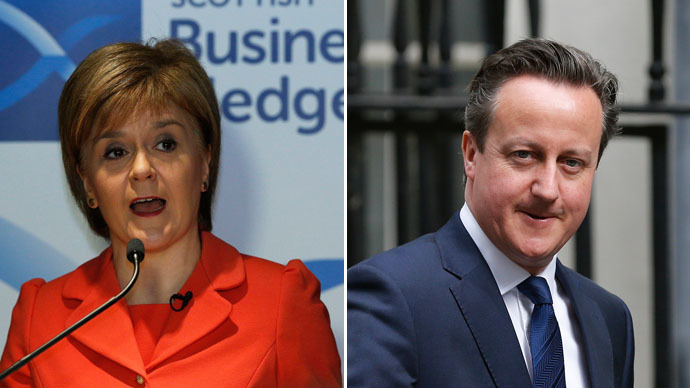SNP attacks Tory govt’s austerity and ‘woefully lacking’ devolution plans

Scottish National Party ministers will unleash a dual assault on Tory policy Tuesday in a bid to tackle poverty and bolster Scotland’s economy. The party’s MPs will push for further devolution and try to force the UK government to roll back austerity.
This marks the first serious offensive against the British government by Nicola Sturgeon’s party since its resounding victory across Scotland in May’s general election. The party saw Labour all but wiped out in Scotland, as Scottish nationalists secured 56 out of a possible 59 seats in Westminster.
The SNP’s Scotland Bill will be examined and voted upon by MPs on Tuesday, as it receives its second reading in the House of Commons. Set to offer new powers to Scotland’s parliament, Sturgeon’s party says the legislation is inadequate.
Scottish MPs have proposed amendments to the bill, demanding Westminster shift more fiscal, job creation and welfare policies to the Scottish government.
READ MORE: Cameron must deliver on Scottish devolution pledges, says Sturgeon
READ MORE: Reviving Tony Blair’s New Labour ‘would go down like a bucket of vomit’ in Scotland – MSP
READ MORE: SNP Scottish victory ‘a vote against austerity’ - Sturgeon
SNP Westminster chief Angus Robertson said the legislation is “woefully lacking.”
He said significant fiscal and economic powers remain at the whim of the Tory government.
“As it stands, major powers over social security, the minimum wage and other key economic powers would remain in the hands of David Cameron and George Osborne,” Robertson said.
“It is time these powers were delivered to Scotland to allow us to take real action to grow our economy and tackle poverty.”
In a separate move, the Scottish government will also challenge Chancellor Osborne’s austerity agenda Tuesday.
Scottish Deputy First Minister John Swinney will demand the Conservative UK government ease the scale of spending cuts and channel more investment into public services.
Swinney, who also holds the position of Scottish finance secretary, will use a meeting with Osborne to call for an end to austerity over the course of this parliament.
Swinney insists that halting austerity would still allow the Tory government to honor its debt and borrowing objectives.
The Scotland Bill was announced in the Queen’s Speech on May 27. The legislation evolved in the wake of Britain’s Smith Commission, which was founded after Scotland’s independence referendum.
In its current form, the 74-page bill falls short of a cross-party agreement to transfer “extensive new powers” to Scotland’s parliament in Holyrood.
The pledge was signed by Prime Minister Cameron, then-leader of the Liberal Democrats Nick Clegg and former Labour Party leader Ed Miliband as last September’s Scottish independence referendum neared.
Following Cameron’s victory on May 7 and the emergence of a majority Tory government, the PM vowed to foster unity under the “mantle of One Nation.”
“I want to bring our country together, not least by implementing as fast as we can the devolution that we rightly promised for Wales and for Scotland,” he said.
However, discontent is growing in Scotland over the devolution bill, with critics warning that Cameron’s “One Nation” pledge will not be implemented. While the Scottish parliament is set to receive some devolved economic and fiscal powers, Scottish MPs warn they are piecemeal and deficient.
Despite this appraisal, the bill is seen as a springboard for limited Scottish economic sovereignty. In a bid to secure freedom from subordination to the Treasury, the SNP secured a mandate on May 7 to ensure the terms pledged in the Smith Agreement are delivered speedily and without compromise.
Labour's Shadow Scottish Secretary Ian Murray, the party’s sole Scottish MP in Westminster, said his party will propose a series of amendments to strengthen the Scotland Bill. Labour says it wants the Scottish parliament to have full control over welfare policies.
“More devolution can protect the most vulnerable in Scotland from the worst of the Tories,” Murray said. “The major new powers coming to Scotland give us the chance to do things differently, so that never again can a right-wing government impose the bedroom tax on struggling families.”
Swinney said the proposed bill fails to deliver the terms agreed in the Smith Agreement “either in spirit or law.”
He said the SNP’s suggested amendments will bring the legislation “up to scratch” and ensure the Smith Agreement is implemented “in full.”
“That's the absolute minimum we need if the prime minister’s respect agenda is to have any credibility,” he said.
SNP ministers are also planning to challenge the Bill in the Scottish parliament. They have formally requested alterations to the committee tasked with examining the legislation. They also recently said they will hold a meeting for those who may be affected by the bill, and will release plans for further devolution beyond the scope of the legislation in the near future.












